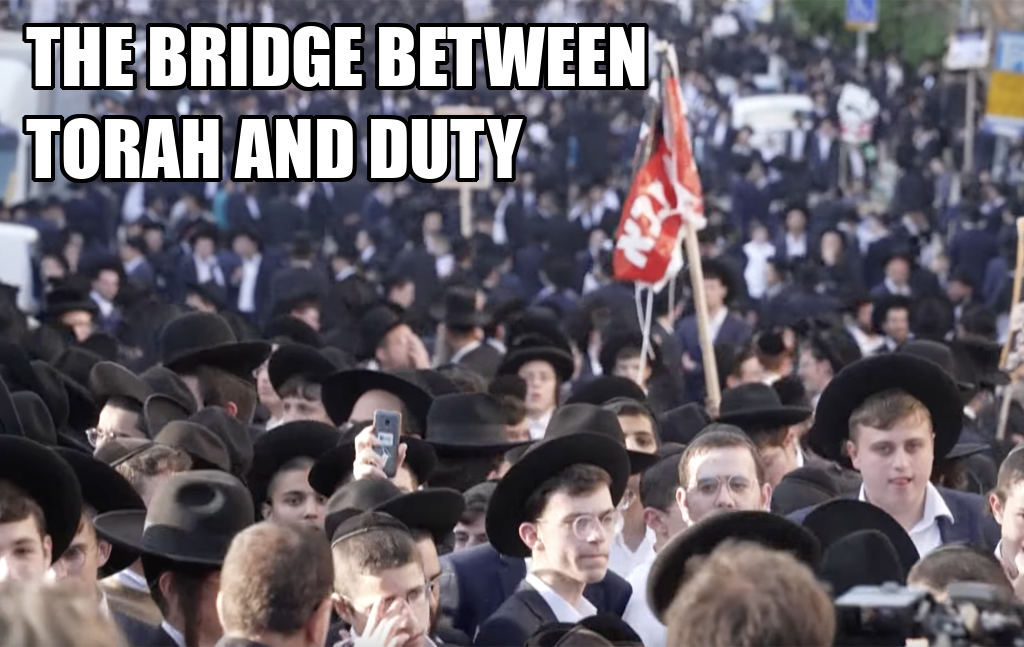THE BRIDGE BETWEEN TORAH AND DUTY

I was grateful to see that my recent article, Beyond Slogans and Protests, prompted thoughtful engagement, including an anonymous response titled Torah Isn’t a Slogan — It’s Our Shield. The article was written respectfully, with conviction and sincerity. I appreciate that, though I was surprised that the author chose to remain anonymous.
It is clear from his piece that we share much in common. We both love Torah. We both believe in its eternal truth. And we both want the Jewish people to thrive in both safety and sanctity. Where we differ is not in belief, but in how that belief is expressed in real life.
Because Torah — while it is indeed our eternal shield — was never meant to replace our obligation to act responsibly in meeting the practical and security needs of our nation.
The writer claims Haredi families in Israel live as they do out of genuine conviction rather than coercion. Here lies a key contrast: while this may hold true for some, and possibly many, for others the choice is restricted by communal realities – something I know firsthand from candid conversations. The distinction is between voluntary commitment and pressured conformity.
Let me set it out bluntly. When a young Haredi man in Israel wants to pursue a different path from the one set for him by communal norms, he has few real options. It may be that he seeks a broader education, or wishes to serve in the army or do some other form of national service — yet he is told, in no uncertain terms, that such a move would be a betrayal of the Torah and of his community. Those who take that path often find themselves ostracized, unable to marry, or unwelcome in the families and neighborhoods that raised them.
These are not boys looking to abandon the Haredi way of life. They simply don’t fit the narrow, cookie-cutter mold imposed by their surroundings, a rigidity far less pronounced among Haredim outside Israel.
In fact, studies suggest that a significant percentage of Haredim in the diaspora participate in secular education and professional careers while maintaining their religious commitments. For instance, recent surveys indicate that nearly 60% of Haredi men in the United States pursue some form of higher education or vocational training, which allows them to integrate their Haredi life with broader opportunities and still remain fully accepted within their communities.
To be clear, the kind of pressure this puts on young Israeli Haredim makes no sense from a hashkafic perspective. Torah learning that can only survive by locking the doors from the inside isn’t Torah at its best.
King Solomon said it beautifully in Mishlei (3:17): “Deracheha darchei noam, ve’chol nesivoseha shalom” — “Her ways are ways of pleasantness, and all her paths are peace.” A Torah way of life should not depend on fear or social intimidation to keep its adherents in line. The Haredi way of life is beautiful — and it should be that beauty, not pressure or isolation, that enables it to flourish.
The unnamed author objects to my description of the “million-man march” as a protest. He insists it was an Atzeres Tefillah. I’m sure it was called that sincerely, and that many who attended genuinely believed they were gathering to pray. However, from the outside looking in, to the rest of Israel and for everyone else watching, it looked, sounded, and felt unmistakably like a political rally. Because, let’s be honest: that’s what it was, whatever the event’s gentle title might have suggested.
Placards were raised high, with some being deliberately provocative. One banner quoted a prominent rabbi warning that “a boy who enlists in the [Israeli] army is evading service in God’s army and betraying the God of Israel,” adding that “his punishment will be great.”
This message is troubling, as it encapsulates the divisive rhetoric that shifts the dialogue away from unity and shared purpose. And it is certainly not the language of prayer or reflection, or of the high Torah ideals we must reflect. What was billed as a prayer event was, in reality, a full-blown political rally, a protest against the very notion that Torah study and civic responsibility through national service can coexist.
I agree completely with the anonymous writer that Torah study is a shield. Torah learning sustains the world. But the same Torah also commands: Ki teitzei lamilchama al oyevecha — “When you go out to war against your enemies.” Not if — but when. And the Torah clearly doesn’t tell the Jewish people to fight wars from inside a yeshiva, but with weapons on a battlefield, as soldiers.
King David didn’t only compose Tehillim — he trained and led an army. The Chashmonaim didn’t just study Torah; they fought for it — literally — against the Greeks. With weapons in hand, Jewish soldiers battled our enemies and prevailed. When, exactly, was that model erased from Jewish tradition? When was it decided that truly religious Jews can never bear arms, and that only the secular or less observant must defend the nation? If anything, the more devout you are, the more you should be out there fighting for the Jewish nation.
To push the point further: imagine if the IDF Chief of Staff announced that, having been moved by the stirring prayers and speeches at the Atzeres, he had decided — with the government’s full support — to disband the IDF and send every soldier, from new recruits to generals, to yeshiva or seminary. Would that be acceptable? If Torah study alone truly protects the Jewish people, surely that would be the ideal outcome.
And why not relocate the great yeshivot — Ponevezh, Mir, Chevron — to Kfar Aza, Sderot, Kerem Shalom, or Metulla? Let them defend Israel from its enemies on its actual borders, not from the safety of Bnei Brak and Jerusalem. If the merit of Torah study is our sole defense, wouldn’t their presence at the borders suffice to repel any invasion?
Well, if the idea of sending all soldiers to yeshiva sounds absurd, or relocating yeshivas to warzones sounds ridiculous, then claiming Torah alone protects us—and therefore army service isn’t needed—is equally untenable. And if we agree Israel needs an army, why should just one group be exempt from duty?
The writer cites the Gulf War as proof that it is God, not the IDF, who protects us — pointing to the astonishingly few deaths from the Scud missile attacks. But that argument misses the point entirely. Yes, it was miraculous. But does that mean the gas masks, sealed rooms, and army-enforced safety drills were meaningless? Are we not commanded to make our hishtadlut — our best human effort — so that God can do the rest?
When Israel ensures it has a military edge over its enemies and then witnesses a miracle, that’s not a failure of emunah — that’s the very definition of it. To deny the partnership between divine providence and human action isn’t faith at all — it’s a distortion of faith, a kind of theological fatalism that borders on heresy.
We’re told the IDF doesn’t need more soldiers, and that it targets Haredim out of prejudice or hostility. That’s simply not true. The IDF’s challenge — Israel’s challenge — our challenge — is not some cartoonish clash between villains and victims.
Surely we can all recognize that no society can endure when one group carries all the physical risk while another carries none — especially when both share the same land, the same destiny, and the same desire for safety and success.
Kol Yisrael arevim zeh lazeh doesn’t mean we get to choose the form of our mutual responsibility. Being in this together means finding a path forward that honors everyone — not one that exempts some while others sacrifice on their behalf.
And then there’s the thorny question of the thousands of Haredi young men who don’t actually learn full-time yet still claim exemption. If the Torah exemption is truly about Torah, then those not learning should enlist.
What’s their justification? If the concern is the IDF’s spiritual environment — then fix it. Engage. Partner. Find a solution. But don’t hide behind the claim of persecution while refusing to take part in shaping the remedy. And certainly don’t invoke Torah study as an excuse when it has nothing to do with Torah study.
Living in Eretz Yisrael must not serve as an escape hatch from civic duty. No one forces Haredim to live in Israel. But if they choose to — and benefit from its hospitals, its roads, its infrastructure, its countless amenities, and the security setup that allows all of that to exist — they cannot act as if these blessings exist in some parallel universe untouched by the State.
The writer says, “We aren’t living in parallel universes.” I totally agree — but the way Israeli Haredim act often suggests otherwise.
Throughout Jewish history, the Torah has been the source of our obligations, not an excuse to evade them. We are one people, sharing one destiny. If we truly believe that Torah study is the lifeline of the nation, then we must live as part of that nation, not use Torah as a foil to divide it. Torah should make us better citizens, not absent ones.
The question is not whether Torah protects us — it does. The real question is whether those who learn it, and make Torah study the central feature of their lives, remember that national protection comes with national participation — and that participation means taking responsibility through engagement and connection, not through separation or withdrawal. Only when we remember that truth will Torah truly protect us all.

